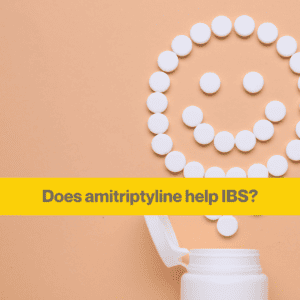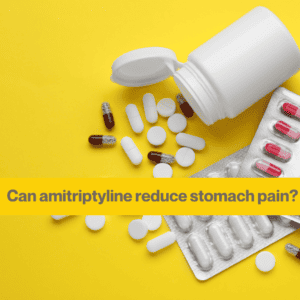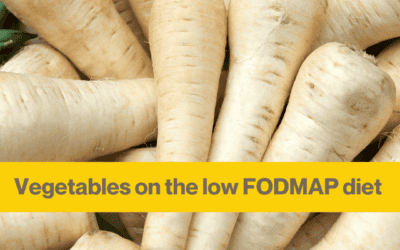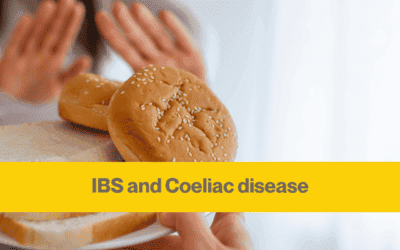Have you been offered a low dose of amitriptyline for IBS? It’s a antidepressant that’s sometimes offered to patients who experience significant abdominal pain related to digestion.
If you’re unsure about taking medication for your IBS, you’re not alone. I hear this from my clients all the time. Even your doctor might be unconvinced of the benefits.
Only 50% of doctors surveyed in the UK in 2014 felt tricyclic antidepressants were useful in managing their patient’s IBS. In the same study less than 10% of medics said they ‘often’ or ‘always’ used these drugs.
Does low dose amitriptyline work for IBS?
A large scale study conducted in 2023 showed very promising results for using amitriptyline at a low dose compared to placebo.
The study involved 372 participants who had IBS-D or IBS-M, with no depression, and moderate to severe IBS symptoms.
They found people who took amitriptyline had a 30% or greater decrease in abdominal pain severity on the IBS-symptom severity score after taking it for six months. This was compared to people who had a placebo treatment.
It might not be so good for bloating
it’s not a cure all for all IBS symptoms though unfortunately. The people taking the drug didn’t see an improvement in abdominal distension severity.
Was it a good study?
This new study was very thorough and followed the best methodology. It was a randomised, multi-centre, parallel-group, two-arm, double-blind, placebo-controlled superiority trial of low-dose amitriptyline as a second-line treatment for people with IBS in primary care.
Amitriptyline is a second line treatment
Before you rush to ask for this medication, it’s important you’ve tried all the various options available to you like diet and lifestyle. In this study all participants had already tried dietary changes and lifestyle advice, soluble fibre, antispasmodics, laxatives, or anti-diarrhoeals, without success
How does amitriptyline work for IBS?
When taken as an antidepressant amitriptyline increases the levels of the neurotransmitters noradrenaline and serotonin. This may help to lift mood in some people, but it’s at such a low dose it shouldn’t affect your mood.
There are a number of ways tricyclic antidepressants may improve symptoms of IBS.
- Firstly low doses of antidepressants may relieve the visceral pain which you might get after eating, or from trapped gas. This happens through a reduction in your brain’s response to the pain messages (in the perigenual anterior cingulate)
- Secondly TCAs might affect gastrointestinal motility by affecting the levels of serotonin in the gut. Serotonin in the gut affects the speed of food through your intestines. For example, Serotonin 3 receptor antagonists (such as Ondansetron) reduce pain and diarrhoea in IBS, while serotonin 4 receptor agonists (e.g. Cisapride and tegaserod) reduce pain and constipation in IBS.
- Amitriptyline may change the response to stress and improve your gut brain connection.
How to take amitriptyline for IBS
Always follow your doctor’s instructions, and tell them if you don’t feel the trial is going well. The NICE guidelines state
TCAs should be started at a low dose (for example 10 mg amitriptyline once a day) and titrated slowly to a maximum of 30–50 mg once a day.
Your doctor may be able to increase the dose, or change to an alternative medication if you don’t feel like it’s making a difference or you have any side effects.
Does this latest study match other research in this area?
This study was one of the first large scale primary care randomised controlled trials for IBS, and some of the most positive results.
Previous studies have found another tricyclic antidepressant Desipramine was beneficial in women with diarrhoea-predominant symptoms compared to placebo for moderate IBS symptoms,
Other studies have found improvements in abdominal pain in people with IBS-D
Take control of IBS
Are there side effects of taking amitriptyline for IBS?
In the recently study one quarter of the people dropped out of the study, some citing mild symptoms such as drowsiness and dry mouth. Other possible side effects include dry eyes, urinary retention, constipation, and cardiac arrhythmias.
The researchers admit that the results were more effective in people who had diarrhoea predominant symptoms. They conclude “effectiveness of low-dose amitriptyline in those with IBS-C or IBS-U might be more difficult to judge.”
The study found amitriptyline was safe and well tolerated, when titrated according to symptom response and side-effects. This means the dose was increased or decreased according to how the people felt during the study.
Are you worried about taking an antidepressant drug?
My Gut Reset clients often say they don’t want to be taking medication. I really get that, no one wants to rely on drugs to feel good. And you might be worrying about taking a mood altering substance.
It’s an important difference that this low dose doesn’t have expected mood changes. It just works on the nervous system in your gut.
When studies have looked at using a different type of antidepressant, a Selective Serotonin Reuptake Inhibitor (SSRI) the results showed limited to no improvement for digestive symptoms.
How much does your abdominal pain affect your life?
If your pain is so debilitating that you’re not sleeping. Or you are not able to socialise, it could be worth a discussion with your doctor.
Firstly consider what kind of other activities you’ve tried.
- Have you given the dietary changes a real go – this may involve cutting more foods out, or actually introducing more foods in?
- Are you prioritising sleep and getting to bed on time
- Have you found ways to manage your stress levels
- Do you regularly drink alcohol, can you cut this down?
- Are you exercising your body every day? This reduces stress and helps you get better sleep.
If you’ve exhausted all these ideas, maybe it’s time to ask your doctor about this type of treatment and whether it might be suitable for you.
If you want help figuring out your IBS triggers, start your Gut Reset with me over 3 months to find a diet that works for you. Just set up a free call to discuss what you need some help with. Email info@goodnessme-nutrition.com

IBS Nutritionist
Hi, I'm Anna Mapson, registered Nutritional Therapist.
I help people with IBS and SIBO get control of unpredictable gut symptoms to find long term relief from painful and embarrassing IBS without restrictive dieting.
I can help you to:
- understand your digestion better, so you recognise your triggers
- eat a well balanced diet, with tasty meals that are simple to prepare
- reintroduce your trigger foods so you can get back to enjoying food again
Find more about my 3 month 1:1 Gut Reset programme.
How to spot AI generated nutrition blogs
How can you tell if artificial intelligence (AI) wrote something you read online? Well unfortunately since the AI models are so good nowadays, sometimes you won't be able to! It can be amazingly realistic. And as a writer using apps like Chat GPT can save me time...
Low FODMAP Vegetables for IBS relief
Confused about which vegetables are low FODMAP? Dealing with IBS can throw some serious curveballs into your meal planning, right? But don't worry, you can still include lots of veg in your meals. I'm here to dish out some tasty tips on navigating the low FODMAP diet...
IBS and Coeliac Disease: A guide to understanding & diagnosis
Are you confused about IBS and coeliac disease? Maybe you feel better without gluten in your diet, but you're not sure whether you've been tested for coeliac disease or not. The cross over between IBS and coeliac disease Coeliac disease is an autoimmune condition...






